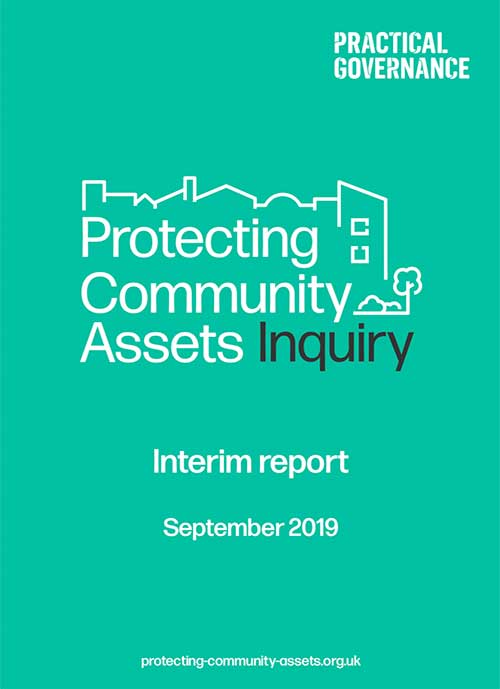Overview
The Protecting Community Assets Inquiry is a short, defined piece of work seeking to identify practical ways to protect existing community assets in England for the long-term benefit of local communities.
It has brought together a wide range of contributors all of whom have direct experience of managing, supporting or funding community assets and who have been willing not just to understand the challenges and opportunities but help shape some practical next steps.
Our interim report was published on 17 September 2019 and we are actively seeking contributions to fill in the gaps in our collective knowledge and understanding, and most importantly gather interest or support to take specific ideas forward.
The plan is to continue work on the inquiry to at least January 2020, taking feedback from what we have started here. We intend to publish a further update in the first half of 2020 with a confirmed and resourced timetable of next steps.
“It’s really important that communities should be involved and engaged in protecting the special buildings and places that mean the most to them” – Duncan Laird, Head of Urban Places, National Trust
“Community owned assets are incredibly important for bringing people together, instilling pride, and providing a home for essential services”
– Vidhya Alakeson, Chief Executive at Power to Change Trust
“This inquiry has been a collaborative effort to identify practical tools and initiatives that will reduce the loss/failure of community assets. We now need to collectively continue the momentum that has been built and seize the opportunity to turn these ideas into actions”
– Rob Benfield, Director of Enterprise and Development, Social Investment Business
“The loss of Hastings Pier from community ownership and the experience of that ultimately heart-breaking process demonstrated the need to learn the lessons. We hope that through this Inquiry and its practical ideas other community-owned assets can be protected”
– Jess Steele Director Jericho Road Solutions (former trustee of White Rock Trust, advisor Hastings Pier Charity, member of Friends of Hastings Pier)
Objectives
To publish an inquiry report in September 2019 with practical recommendations to help protect community assets in England for the long-term benefit of local communities.
Recommendations will be considered across three broad areas: ‘prevention’, ‘rescue’ and ‘impact limitation’
| Area | Description |
|---|---|
| Prevention |
Ownership structure: how best to structure community asset ownership and operations to prevent assets falling out of community hands, e.g. separation of the operations from the asset; length of leases; level of direct community participation in key decisions
Commerciality: how best to test and support long-term commercial viability of community ownership e.g. level of community use of the asset on some form of commercial basis; level of participation; capacity and experience of the leadership team |
| Rescue |
Early support: how, when and by whom coordinated support could be provided to those running or those with an important stake in community assets which face serious threats to long-term viability e.g. life-boat or rescue packages from funders or umbrella bodies; whistle-blowing mechanisms via regulator; peer support through greater financial and operational co-operation |
| Impact Limitation |
Review of the administration process: what an appropriate administration process for community assets might be and how might it be implemented e.g. emphasis on social value; role and engagement of public/ members/ shareholders |
Recommendations will cover both the structures, processes and legal frameworks that might have an impact, but also place equal emphasis on how existing frameworks are understood and applied in practice.
Scope
The focus of this inquiry are existing community-owned assets.
In this context we apply the following definitions:
- Community-owned assets: assets where there is already a significant community stake in place alongside significant and demonstrable local community participation in decision-making. This could apply to any legal structure.
- Long-term benefit of local communities: assets which are held and preserved primarily for the benefit of the local community both now and for future generations. This might include organisations who hold assets without a statutory asset lock as long as they have a regulated purpose beyond sole profit maximisation.
We have not set any limits of what ‘significant’ might mean in either of these cases. We will apply the judgement of the inquiry participants in each case.





















